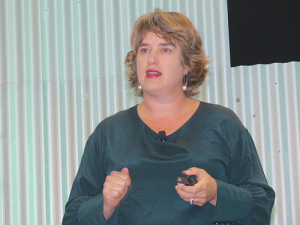Dr Anna Campbell runs the science-based company AbacusBio, based in Dunedin and Scotland, consulting worldwide on agri-related matters.
She says smaller companies see what opportunities exist in the market and work backwards, unlike big players that tend to work off an existing market.
“Big companies are more concerned with profit and loss.
“A big company [is after] scale and efficiency and that’s fantastic and what they are good at,” Campbell told Rural News.
“But they are not necessarily good at taking themselves out of a hierarchical organisation and being free-thinking and allowing for failure. Good innovative companies have the mindset ‘it’s ok to fail’ -- it’s a different mindset.”
She says many larger companies are interested in innovation, but often their response is to buy up the smaller innovative companies and absorb them into their conglomerates.
Campbell claims a lot of the government drive in NZ targets our big exporters, not necessarily our small innovators, and she believes we need to start supporting our small innovators more. This is especially important now because of an international backlash against livestock and its place in the environment.
“But NZ has farming systems different from the rest of the world and we don’t appreciate that. We can do more on this connection between food and health, which is what our systems are about,” she explains.
“Consumers are going to have a lot more data; and how do we match the product to the right consumers? That requires R&D at a product level and at consumer level.”
Campbell says Zespri has done a lot of great work in proving and publicising the health attributes of green kiwifruit, and she believes other industries should follow its example.
“There is still basic research that could be done, particularly on red meat products... and their impact on, say... the elderly, high-end sportswomen, etc.”
Campbell says understanding the concerns and needs of consumers is critical for NZ. For example, UK consumers are more concerned about animal welfare issues, whereas food safety tops the list for Chinese consumers.
Consumers go to great lengths to get information about the food they are buying, often via social media.
Campbell says, as a scientist, that she knows NZ must communicate better to consumers the right message about food, and have the scientific evidence to back this up.
“This is necessary at a time when there are lots of mixed messages about food being touted in the marketplace.”









